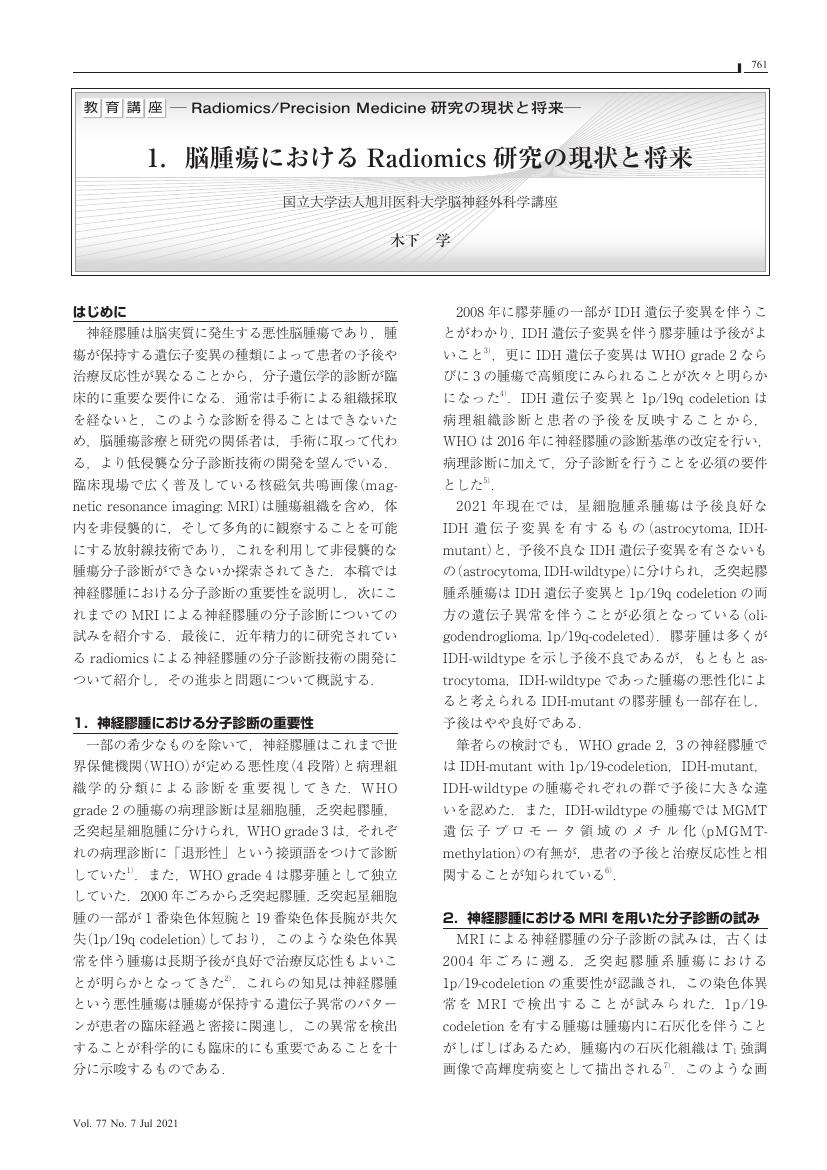9 0 0 0 OA うつ病の病態における神経炎症仮説と治療ターゲットとしての可能性 【優秀演題賞】
- 著者
- 古賀 農人 戸田 裕之 木下 学 吉野 相英
- 出版者
- 一般社団法人 日本エンドトキシン・自然免疫研究会
- 雑誌
- エンドトキシン・自然免疫研究 (ISSN:24341177)
- 巻号頁・発行日
- vol.22, pp.30-34, 2019 (Released:2019-11-06)
- 参考文献数
- 4
Most of the current depression drugs have been developed based on the monoamine hypothesis. However, about 30% of patients indicate resistance to medication, and patients with relatively mild depression get only a small benefit from antidepressants. In addition, although an increase in monoamine concentration in synaptic gaps by monoamine transporter inhibition occurs within a relatively short time, it takes about six weeks to show an antidepressant effect in actual clinical settings. There are cases in which an antidepressant effect is observed for drugs that do not regulate the amount of monoamine. These facts suggest the presence of a variety of pathophysiologies in depression and depressive symptoms. Recently, a relationship between the onset of depression and the expression levels of immune-related molecules such as cytokines in the blood and the brain derived from patients with depression has been pointed out. Although there is so far no medication targeting neuroinflammation, many recent studies have shown that inflammation is not negligible and a significant factor in the pathogenesis of depression. Therefore, it is meaningful to focus on inflammation for elucidating the pathogenesis and developing medications. In this paper, we describe the pathogenesis pathways known to be involved in the inflammation, the serotonin hypothesis, hypothalamic-pituitary-adrenal axis hypothesis, and neurodegeneration/neurogenesis hypothesis and describe the applications to therapy and preventions based on them.
2 0 0 0 OA 神経膠腫の質的診断の進歩 ―画像と遺伝子―
- 著者
- 木下 学 金村 米博 成田 善孝 貴島 晴彦
- 出版者
- 一般社団法人日本脳神経外科コングレス
- 雑誌
- 脳神経外科ジャーナル (ISSN:0917950X)
- 巻号頁・発行日
- vol.31, no.1, pp.4-10, 2022 (Released:2022-01-25)
- 参考文献数
- 15
神経膠腫診療における放射線画像の役割は大きく, 放射線画像で神経膠腫の分子診断を行おうとする研究は年々盛んになっている. 本稿では直近10年でこの分野においてどのような研究成果があったのかを①神経膠腫のradiomics研究, ②T2-FLAIR mismatch signの発見, そして③定量的MRIへの期待という3項目に分けて説明し, 神経膠腫の放射線画像による質的診断がどのように発展してきたか, あるいは現状ではどのような問題点が指摘できるのかについて理解することをめざす.
- 著者
- 木幡 悠士 羽山 広文 絵内 正道 菊田 弘輝 木下 学
- 出版者
- 一般社団法人日本建築学会
- 雑誌
- 日本建築学会北海道支部研究報告集 (ISSN:13440705)
- 巻号頁・発行日
- no.80, pp.401-404, 2007-07-21
1 0 0 0 OA I-26 データセンターの空調システムの信頼度設計に関する考察
- 著者
- 西田 龍一 藁谷 至誠 関口 圭輔 木下 学 三宅 弘朗 植草 常雄
- 出版者
- 公益社団法人 空気調和・衛生工学会
- 雑誌
- 空気調和・衛生工学会大会 学術講演論文集 平成19年 (ISSN:18803806)
- 巻号頁・発行日
- pp.1559-1562, 2007-08-24 (Released:2017-08-31)
With the current growth in ICT-related business, the machine rooms installed information and communication equipmentsis installed are rapidly increasing in temperature. Since high temperatures damage information and communication machinery, a stable air-conditioning system is indispensable to a stable information and communication service. Therefore,the reliability of an air-conditioning system must be precisely evaluated when planning a stable information and communication service.The reliability of air conditioning and indicators of reliable air-conditioning system design areexamined in actual situations.
1 0 0 0 OA 集束超音波による脳への薬剤送達技術開発
- 著者
- 木下 学 貴島 晴彦
- 出版者
- 一般社団法人日本脳神経超音波学会
- 雑誌
- Neurosonology:神経超音波医学 (ISSN:0917074X)
- 巻号頁・発行日
- vol.35, no.1, pp.1-3, 2022-04-30 (Released:2022-05-12)
- 参考文献数
- 12
1 0 0 0 OA 人工血液 ~外傷治療における明日にかける橋~
- 著者
- 木下 学 萩沢 康介 石田 治 齋藤 大蔵 酒井 宏水 武岡 真司
- 出版者
- 一般社団法人 日本外傷学会
- 雑誌
- 日本外傷学会雑誌 (ISSN:13406264)
- 巻号頁・発行日
- pp.35.4_05, (Released:2021-10-07)
- 参考文献数
- 36
私たちは止血能と酸素運搬能を有し, 血液型に関係なく投与できる人工血液を研究開発している. 人工血液は人工血小板と人工赤血球から成り, 室温静置で長期保存可能で, 備蓄や病院前治療に適していると考える. 人工血小板はリポソームに血小板活性化因子であるアデノシン二リン酸 (ADP) を内包し, 表面に人工的に合成したフィブリノーゲンの活性部位を付着させている. 出血部位に集積し, 血小板血栓形成を促進することで, 血小板減少性の易出血病態でも血小板と同様の止血能を発揮する. 人工赤血球は使用期限の切れた輸血用赤血球からヘモグロビンを精製し, 同様にリポソームに内包したもので, 優れた酸素運搬能を有している. 人工血液は血小板減少による凝固障害を呈した家兎の致死性出血モデルにおいて, 通常の血小板と赤血球の輸血に匹敵する顕著な止血救命効果が認められ, 外傷治療における有用性が期待される.
1 0 0 0 LPSプレコンディショニングによるマラリア重篤化抑制手法の確立
- 著者
- 小野 岳史 木下 学
- 出版者
- 防衛医科大学校(医学教育部医学科進学課程及び専門課程、動物実験施設、共同利用研究施設、病院並びに防衛
- 雑誌
- 基盤研究(C)
- 巻号頁・発行日
- 2019-04-01
極微量のLPSの3日間投与により、炎症反応を抑制しつつ貪食細胞活性が大幅に増強すること、大腸菌敗血症の予後が劇的に改善することをマウスで見出した。これはLPSプレコンディショニングというべき現象で、マラリア原虫感染の予後についても改善し得る可能性が予備実験で示唆された。本研究では、LPSプレコンディショニングによるマラリア感染の重篤化阻止を目標として、1) LPSプレコンディショニングがネズミマラリア原虫致死株感染における重篤化抑制機構の解明、2) LPSプレコンディショニングによる脳マラリア発症阻止の検討、3) 弱毒性LPSによる安全なLPSプレコンディショニング導入の探索、の3点を行う。
1 0 0 0 OA 制御性T細胞に着目したsepsisに続発する免疫抑制状態
- 著者
- 辻本 広紀 平木 修一 木下 学 愛甲 聡 小野 聡 山本 順司 長谷 和生
- 出版者
- 日本腹部救急医学会
- 雑誌
- 日本腹部救急医学会雑誌 (ISSN:13402242)
- 巻号頁・発行日
- vol.29, no.5, pp.711-715, 2009-07-30 (Released:2009-09-08)
- 参考文献数
- 19
sepsisに派生する免疫抑制状態は,時に重篤な多臓器障害を併発するため,それらの病態形成メカニズムの解明やそれに基づいた対策が重要である。そこでsepsisに続発する免疫抑制状態に関して,制御性T細胞(以下,Treg)の役割に着目して,最近の文献および著者らの検討結果を概説した。TregはCD4+CD25+Foxp3+などの特徴を有し,ほかのT細胞の増殖・活性化を強力に抑制すると考えられている。sepsis患者や腹膜炎マウスの末梢血では,Tregの割合が著明に増加しており,この増加がsepsisにおける免疫抑制状態に深く関与しているものと考えられる。抗IL-10抗体や抗TGF-β抗体投与は,腹膜炎マウスで認められるTregの増加を阻害することができ,さらに抗TGF-β抗体投与により予後が改善した。sepsisに派生する重篤な免疫抑制状態に対して免疫学的特徴,特にTregに着目したimmunomodulation therapyは,今後sepsisの救命率向上に向けた新たな治療法となりうるものと考えられる。
1 0 0 0 1.脳腫瘍における Radiomics 研究の現状と将来
- 著者
- 木下 学
- 出版者
- 公益社団法人 日本放射線技術学会
- 雑誌
- 日本放射線技術学会雑誌 (ISSN:03694305)
- 巻号頁・発行日
- vol.77, no.7, pp.761-764, 2021 (Released:2021-07-20)
- 参考文献数
- 16
1 0 0 0 人工赤血球を用いた致死的出血性ショックに対する救命蘇生対策
- 著者
- 羽山 広文 降旗 由紀 木下 学 絵内 正道 森 太郎
- 出版者
- 日本建築学会
- 雑誌
- 大会学術講演梗概集. D-2, 環境工学II, 熱, 湿気, 温熱感, 自然エネルギー, 気流・換気・排煙, 数値流体, 空気清浄, 暖冷房・空調, 熱源設備, 設備応用 (ISSN:1341450X)
- 巻号頁・発行日
- vol.2005, pp.1057-1058, 2005-07-31

